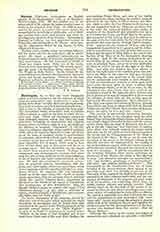

Neckam (NECHAM), ALEXANDER OF, English scholar; b. in Hertfordshire, 1157; d. at Kempsey, Worcestershire, 1217. His first studies were in the abbey school of St. Albans; his higher courses began in Paris, in the school of Petit Pons. In 1180 he commenced his career as teacher with great success, his comprehensive knowledge of philosophy and of theology, and his Latin style, both in prose and verse, attracting many students to his lectures. Returning to England in 1186, he was first appointed teacher at Dunstable, and afterwards at St. Albans. After joining the Augustinian Order, he was chosen, in 1213, Abbot of Cirencester. Neckam was a prolific writer on various subjects, but his works are, for the most part, still in manuscript. He wrote a grammar, commentaries on Scripture and the works of Aristotle, theological treatises, and sermons. He also translated the Fables of Aesop into elegiac verse. Only two of his works, however, have been printed: the “De naturis rerum” and the poem “De laudibus divine sapientiae” (ed. Th. Wright in Rolls Series). In the former he discusses the heavens, the stars, the atmosphere, the earth, water, and living organisms. Neckam is the first European author to mention the mariners’ compass.
J. P. KIRSCH

